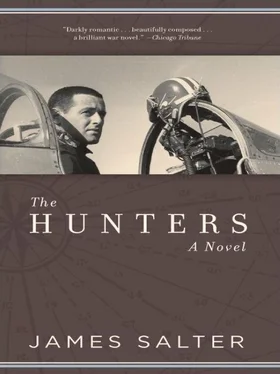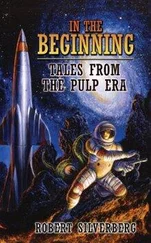Picking his missions carefully because he had so few remaining, Cleve went on. He chose only those that he calculated or guessed might be fruitful, deciding often at the last minute, trusting what was now a hardened, various instinct. There were not many fights, though. The failures added to each other, one by one. He went back over them frequently, all the opportunities lost. How many times had he chased after them when they were already above him, their bellies silver, sailing steadily away. Or gone down low to try and catch them climbing after takeoff, using up all his fuel in a gamble, so that when they did come from somewhere at the very end he could not stay and fight. Or doubled his bets, like a man at a roulette table, by compounding fruitless missions, one after the other, with the certainty that averages would finally work in his favor; but they did not. Or not seen them soon enough when they were there, and missed the critical moment that never returned. He thought of the next chance, if there was to be one, and alternated between bitter hope and despair. The nearly stagnant stream of days moved by.
On his eighty-fifth mission he went only because it was going far north and inland, away from the friendly water. He took it to discipline himself.
The day was cloudy; and they flew a long way past Huichon, in an unfamiliar northeasterly direction, to a junction where the fighter-bombers were hitting bridges across a river that the railroad followed. There was a level deck of clouds at twelve thousand feet. When they dropped down through it, it was like going beneath the surface of the sea. Everything in that submerged world was dim, cool, and unreal. The rugged hills were smothered with greenery like velvet, and the sagging roof of clouds close above made it like being in a great translucent cave. It was a place where he felt he could almost hear the sound of MIGs if they came, but they never did.
The time passed slowly. Every morning early and in the sweaty stillness of every night, he struggled with himself, stemming the weakness that seemed to come then. Open-eyed on his cot, he suffered through the darkness. Then, more than at any other time, there was the constant feeling that he was being consumed, drained; and he did not know the extent of his reserves. It was like flying with the fuel gauge reading zero, waiting for the silence that hit like a hammer. In the air, he did not lack aggressiveness. His determination was never missing there, but during the enormous hours in between he felt himself adrift and helpless. The fifteen, fourteen, thirteen missions ahead seemed many times more dangerous than those that had gone before, when he thought about them, which was often; and yet he simultaneously wished that he had back every one that had been wasted. He drove himself doggedly on.
Pell, by direction of Colonel Imil, was always leading an element, at least, on the missions.
“I want him in a firing position,” the colonel said, not to Cleve. It had come down through the squadron commander and Nolan. “Leading flights if possible. I don’t care if you have to put captains or even majors on his wing. He gets kills I want him out in front.”
“He doesn’t have very much experience, Colonel.”
“To hell with the experience. I’ve got men with all the experience in the world and still not worth a damn.”
“Yes, sir.”
“Fly him in the lead from now on.”
“Yes, sir.”
Hunter and Pettibone both flew as his wingman. They were not especially happy to do it, but they didn’t complain. Pell found MIGs, or, if he did not, they found him.
“I’m going to get one before I leave,” Hunter said. “I don’t care how. It doesn’t matter whose wing I’m on. Just so I get my chance.”
“He’ll do all the shooting, though,” Pettibone said.
“Not all of it. He’s hot, that’s the important thing. He’s running into them all the time.”
It was true. There seemed to be a fight only when Pell was in the air. For Cleve, there was an inevitability of the ships returning in twos, their noses blackened, their tanks gone, if the mission was one on which Pell went and he did not.
There was an escort for a photo-reconnaissance ship, and Pell filled in with another flight. He was leading the element in the close-cover group. Suddenly, there was a MIG nobody had seen coming in to make a pass on the photo ship. It leveled out right in front of Pell, not a thousand feet away His sixth kill. When he taxied back in and parked that day Colonel Imil jumped up on the wing of his ship and swore, impulsively, to get him the Distinguished Service Cross.
It was phenomenal. He was a wonder, a growing myth. He was, at that time, the most famous pilot in the Air Force, and it had all been accomplished in only fifty-odd missions. The bulk of his tour was still ahead of him. Letters containing clippings and photographs from newspapers in the States came almost daily. He read them and then filed them carefully away in cigar boxes. There was always something in the mail for him. Stamp collectors wrote, enclosing printed covers, and requested that he carry them to the Yalu and then endorse them back. Girls in cities he had never been to wrote, some sending their pictures. A periodical wanted an autobiography or at least an article. The president of an aircraft company sent congratulations.
They were already talking about who would get the flight when Cleve was gone. He had only eleven missions left. It would be soon.
“There isn’t but one man in this group who can take over,” Hunter announced.
Kiser was interested.
“Who’s that?” he asked.
“Why, it’s obvious.”
“Pell?”
“Sure. See if he doesn’t.”
“Do you really think he’ll get it?”
“He has to.”
Kiser whistled.
“That’s something. He was a brand-new second lieutenant when he came over, wasn’t he?”
“A lot’s happened since then.”
“But don’t they usually pick captains?”
“Not over a man with six kills.”
“Say,” Kiser asked, “were you with him on any? Did you see them?”
“Sure.”
“What was it like?”
“Just like the combat film they show you.”
“Yes,” Kiser insisted, “but how did it start? How did he actually get them?”
“All kinds of ways,” Hunter said. He was uncomfortable at having spoken too quickly. “Look, you’ll see kills yourself; I guarantee you that.”
There was a pause.
“Have you gotten any?”
“Not yet,” Hunter said.
“I hope I’m along when you do.”
“Maybe you will be.”
Schramm came over and sat down with them. He was a quieter, more threatening fellow than Kiser.
“Has Cleve had the flight all along?” he said.
“Ever since the beginning. He’s been here a long time.”
“Since before Pell got here?”
“Oh, sure.”
“How is it that he only has one MIG, then? Isn’t he any good?”
“It’s not that,” Hunter said.
“How do you explain it then?”
“I don’t know. He’s old, for one thing.”
“How old?”
“Thirty-five, maybe.”
“He’s a regular grandfather, isn’t he?”
“He’s a good pilot,” Hunter said, moved by conscience. “You’d be better off with him than with anybody else, except you probably wouldn’t find anything.”
“Why?”
“I don’t know. I just know that the Doctor is the one who gets them, and that’s what counts. He’s right in the thick of it every time. Once his leader got shot down right alongside of him, but he made it back.”
“Is that right?”
“And got two MIGs while he was at it.”
“What a mission that must have been,” Kiser said.
“Yes, sir. I wasn’t on that one, myself. If Pell doesn’t get himself killed, though, he’ll wind up top ace of the war. Mark my words. I’ve seen them come and go.”
Читать дальше












